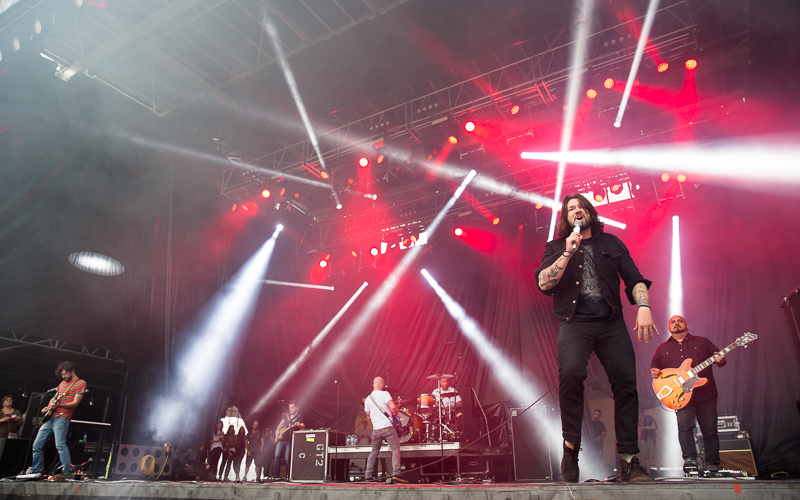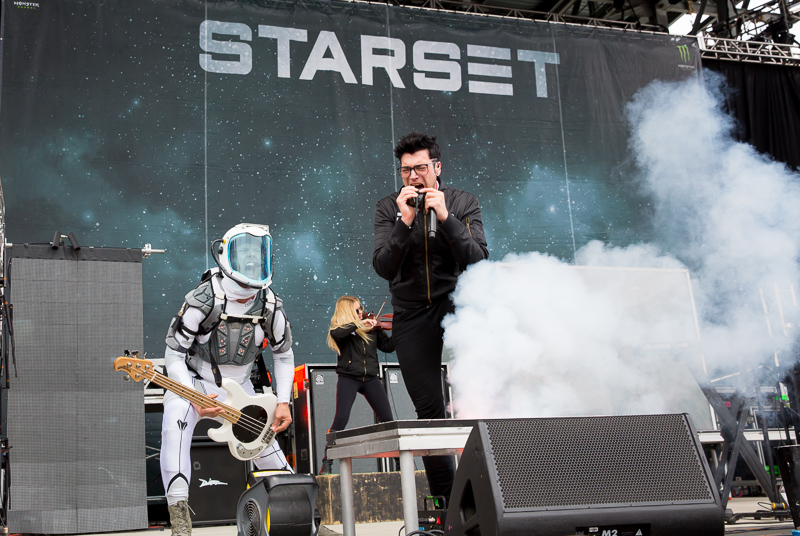Taking Back Sunday: Riding the Emo Wave
The New York emo/rock band’s founder and lead guitarist John Nolan on their new album ‘Tidal Wave’ and finding different audiences for their music
Sandwiched between bands like deathcore unit Whitechapel, Swedish melo-death veterans In Flames and nu-metal frontrunners Papa Roach, New York rockers Taking Back Sunday sure felt like one of the few odd names to show up on the billing at the three-day Rock On The Range festival held recently in Columbus, Ohio, U.S.
But guitarist and founder member John Nolan says that even on past festival shows while touring to promote their seventh album Tidal Wave (2016), they haven’t felt out of place. He says, “The ones we’ve done so far, it’s actually during our set, it feels exactly like any of our other shows. It doesn’t feel like there’s any big change. I feel like the crowd responds the same way, which is good.”
Seated at the media tent at Rock On The Range in a plaid shirt over another T-shirt, Nolan still looks like he’s part of that very band from Long Island who among those credited to have taken the emo movement to mainstream audiences, especially between 2002’s Tell All Your Friends to 2006’s Louder Now. Taking Back Sunday earned a global name through appearances on movie soundtracks (Spider-Man 2, Elektra) and more.
It’s been more than a decade since all that came their way, but Nolan says the band is still committed to carving out their own identity rather than be remembered just as faces of a movement or for a few songs. In a chat with Rolling Stone India at Rock On The Range, Nolan talks about touring and Tidal Wave.
What is it like playing a string of shows like this, where there’s heavy bands? Â
Yeah, it’s definitely a different thing for us. We’re doing a few of these this month. We’re kind of one of the odd bands out. But it’s something we wanted to try ”“ branch out a little bit. Hopefully win some new fans over and see if we can do something different. So far, it’s been good. I think it’s going to be fun.
Who are you looking forward to see here?
Man, there’s a few. Coheed and Cambria are one. We used to play with them and see them around a lot in their early days and it’s been a while. It’s always great when see them.
There’s so many heavier bands playing too, so what is it like having your own audience in here? I think it shows the wide appeal of your music.
It’s a bit of an experiment to see if we can find our audience in a scene like this. Also, kind of grow our audience a little bit.

Taking Back Sunday guitarist John Nolan at Rock On The Range. Photo: Jason Squires
For example, you’re going out on tour with (hardcore/metal act) Every Time I Die next month. How did it come about?
Well, Every Time I Die is a band that we’ve crossed paths with here and there. We’ve been on Warped Tour with them, we’ve been friendly with them but we’ve never actually had a chance to tour together. It’s something that we’ve been talking about and wanting to do for a while.
We felt like it would be a good fit. Obviously, there’s a different sound with each band, but we’re hoping that there’s a good crossover between the fans, which I think there is.
Tidal Wave has done quite well so far. Are you guys going give this album lot more time in terms of promoting?
Right now, it looks we’re doing the summer tour with Every Time I Die, which is pretty extensive. Then, throughout September we have a lot of festival shows that are coming up and there may be some foreign stuff in October. It’ll probably start to wind down by November and we’ll probably start writing and getting into another record.
But it’s been a good run. I think this will be our third U.S. tour since the album came out, so that’s good.
You’d mentioned in an interview how you wanted to play smaller clubs with this record, but you’re also out here playing festivals. How have they been received?
Yeah, when it first came out, we did those [club] shows. One thing that was cool when we did that was we played the entire album from start to finish, which we’ve never done before. That was really cool because we got to watch people learn the album. It had just come out when we played the first show on the tour. We got to see which songs people responded to. We also got to know it in a way that we haven’t known a lot of our other albums, like learning to every single song so that we could do it every night. So now we can go into the album and take out any song we want for the setlist. It gives us more versatility anywhere we play now.
Has that led you to look at your older albums and songs that you don’t play often?
We have talked about that. That’s something we’ve been thinking about for the summer tour, possibly revisiting some stuff we haven’t played in a while and start bringing it into the set.
There’s a lot of stuff from our self-titled album that we don’t play anymore. There are a few songs we didn’t play live at all from that album that I would like to do. It’s tough to do, though. You’ve got to make sure you’re playing the songs that people want to hear too. So it’s hard to find that balance. But it seems like people are missing some of the songs from that album, that this point.
What is it like settling into your own identity and not always being associated with emo?
We’ve tried not to think too much about it. It’s not something that we want to consciously start working against. That whole scene and group of bands has been part of what we’ve been attached to since the beginning, so you don’t want to alienate where you came from. But I think our main focus is on trying to be who we are as a band and not feel the need to conform to anything, go in any direction. We just want to keep doing what we do and carve out our own identity.
Featured image: Taking Back Sunday at Rock On The Range, by Jason Squires.
Taking Back Sunday’s summer tour with Every Time I Die, Modern Chemistry kicked off on July 14th in New York.







